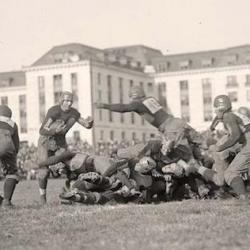In his Megaevents and Modernity: Olympics and Expos in the Growth of Global Culture , Maurice Roche has a scathing review of the International Olympic Committee’s interactions with the Nazis at the Berlin Olympics in 1936: “The IOC collaborated with the Nazi government in allowing what was predictably a major Nazi propaganda exercise to be staged, an event which would use and abuse the good name and reputation of the Olympic movement. They refused to acknowledge and/or condemn Nazi sport policies, and they resisted boycotts and calls to relocate or cancel the event. Furthermore, in spite of much international criticism and condemnation of the Nazi Olympics after the event, they continued to refuse to recognise that collaboration with fascism was threatening to destroy the Olympic movement and its ideals.”
Why? Roche asks. His answer is that the IOC was full of Nazi sympathizers:
“a number of influential members of the IOC were openly fascists or were reasonably suspected to be so. These included the German members Carl Diem (a Nazi collaborator) and the acknowledged Nazi supporters Karl Ritter von Halt (IOC member 1929–64, IOC Executive 1957–63) and General Walter von Reichenau, together with the allegedly fascist aristocrats Count Paolo Thaon di Revel and the Duc de Mecklenberg-Schwerin (the latter was the Italian IOC member 1920–50). In addition, in the 1930s, leading IOC figures such as President Henri Baillet-Latour and Avery Brundage, while not themselves fascists, were, for their own personal reasons prepared to cultivate positive relations with leading politicians and state officials in Nazi Germany.”
Even Pierre de Coubertin, the “father” of the modern Olympics, “periodically expressed positive views about the political leadership and state support for sport under Italian and German fascism in the 1930s. Prior to the Berlin Olympic event, in 1935, he accepted an invitation to visit Berlin where he was feted and gave support to the event’s arrangements in a radio message. In an interview conducted during the Berlin Games de Coubertin is reported as saying that: ‘The imposing success of the Berlin Games has served the Olympic ideal magnificently’, and he was reported as speaking positively of’the fact that the Games of 1936 were illuminated by a Hitlerian force and discipline.’ In 1936 the Nazi regime nominated de Coubertin for the Nobel Prize . . . . Coubertin was also prepared, effectively, to be paid by the Nazi state. For the last few years of his life, until his death in 1937, he was rescued from penury and financed in his retirement in Switzerland by Nazi funds channelled through Carl Diem.”
The connection with fascism isn’t accidental. Both Coubertin’s “Olympism” and Nazism involve a cult of physical fitness and strength; both are full of high ritualization and pageantry; both had internationalist aspirations; both aim to incite and excite masses.















